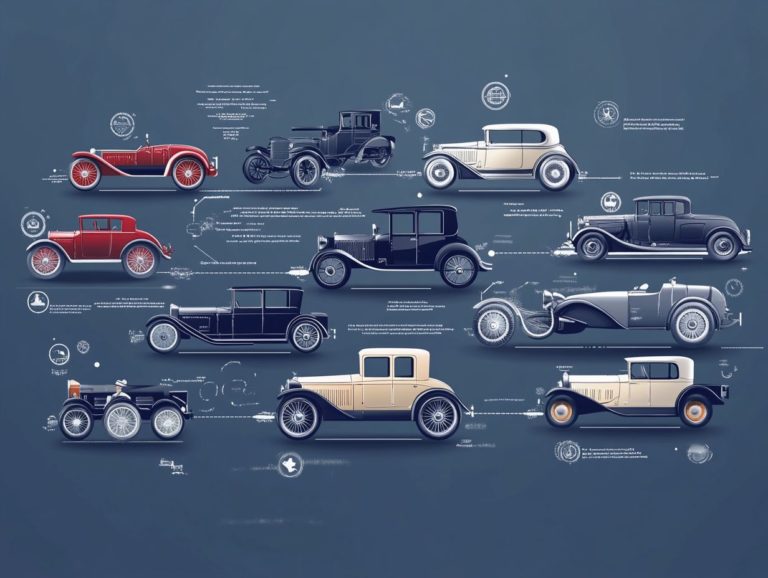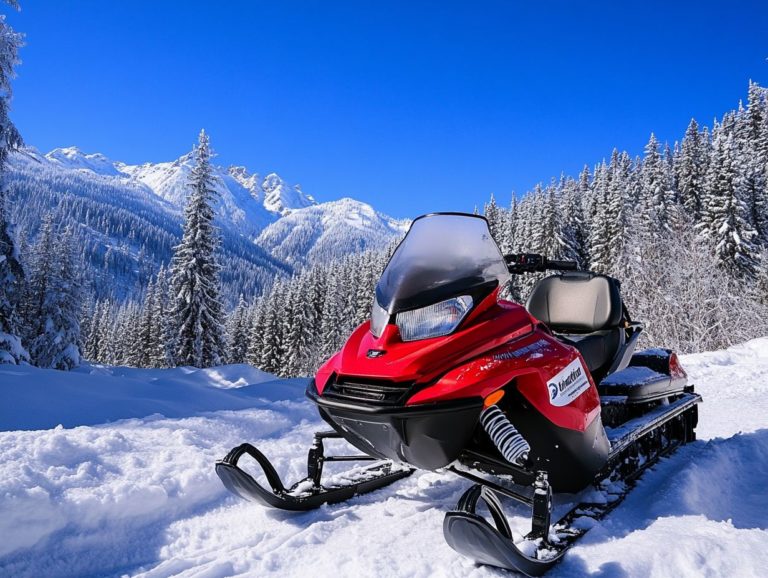What is Coverage for Farm Vehicles?
Farm vehicles are the unsung heroes of modern agriculture. They form the backbone of your daily operations. Given their unique risks and potential liabilities, it s vital to understand the various types of coverage available to protect these invaluable assets.
This article aims to define farm vehicles and highlight the importance of insurance coverage. You ll discover a range of insurance options specifically designed for farmers like you.
We ll explore the factors that influence your coverage decisions. You ll also find tips for selecting the perfect policy tailored to your needs. Let s navigate the intricacies of farm vehicle insurance together, ensuring your farming operations remain well-protected.
Contents
- Key Takeaways:
- Understanding Farm Vehicles
- Importance of Coverage for Farm Vehicles
- Types of Coverage for Farm Vehicles
- Factors Affecting Coverage for Farm Vehicles
- Choosing the Right Coverage for Your Farm Vehicles
- Frequently Asked Questions
- What is Coverage for Farm Vehicles?
- What vehicles are covered under Farm Vehicle Coverage?
- What types of coverage are included in Farm Vehicle Coverage?
- Do I need Farm Vehicle Coverage if I already have auto insurance?
- Do I need Farm Vehicle Coverage if I only use my vehicle for personal use?
- What factors can affect the cost of Farm Vehicle Coverage?
Key Takeaways:
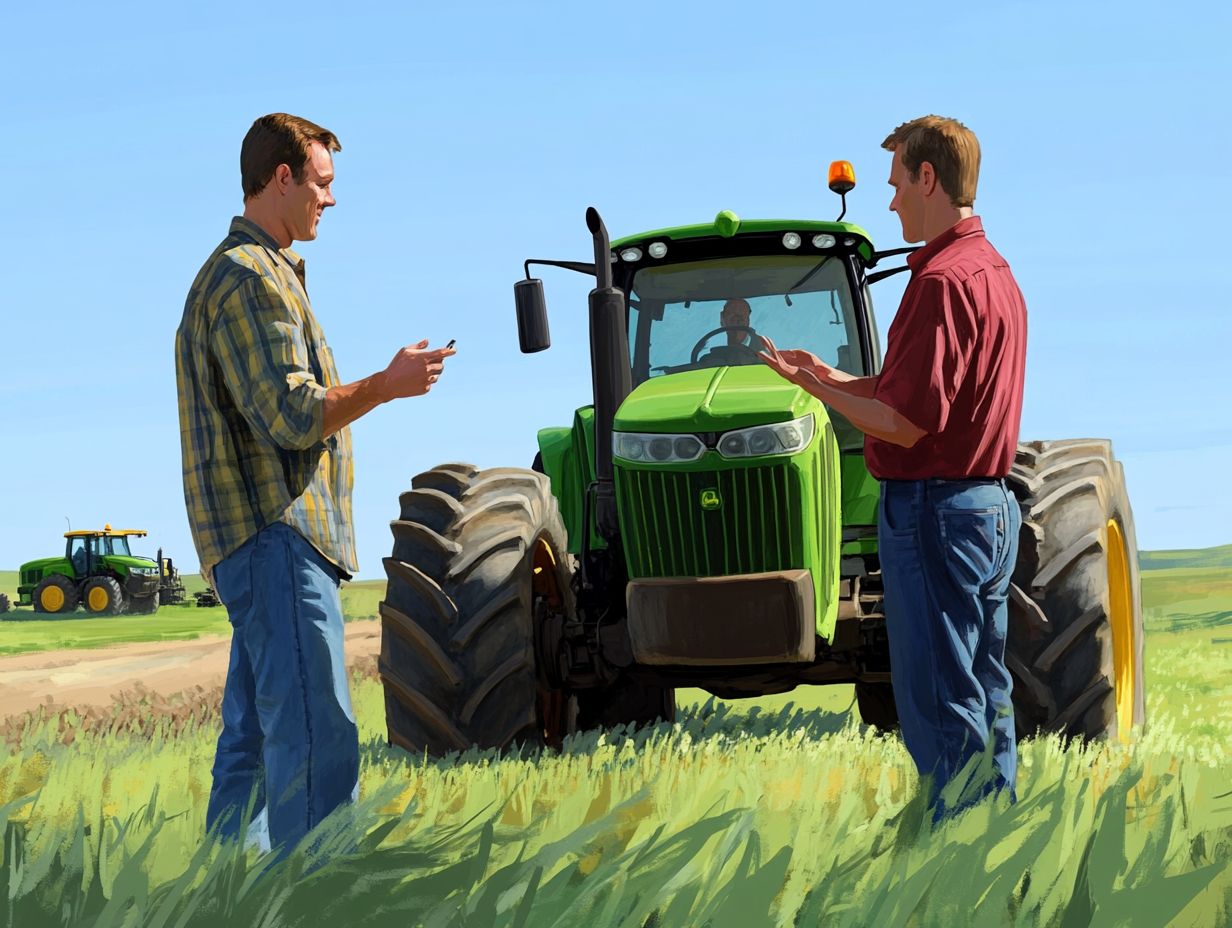
- Coverage for farm vehicles is essential for protecting farmers from potential risks and liabilities.
- Farmers should assess their needs and budget, and compare insurance providers to choose the right coverage for their specific vehicles.
- Farm location, terrain, crops, and livestock can all affect the type and amount of coverage needed.
Understanding Farm Vehicles
Understanding farm vehicles is crucial for you as a farmer in Pennsylvania or Florida. You rely on these vital machines for various agricultural tasks, from delivering goods to transporting commodities.
Farm vehicles vary widely. They include everything from specialized farm trucks to larger commercial vehicles. Each type is designed to fulfill specific roles in your farming operations. Knowing the different types and functions of these vehicles helps you choose the right insurance options to meet your liability coverage and risk management strategies.
Definition and Types of Farm Vehicles
Farm vehicles come in many shapes and sizes, each designed for specific tasks on your farm. This includes different types of farm trucks that help you get your work done efficiently.
These vehicles perform essential roles in your daily tasks. For example, pickups facilitate the transport of goods and people across expansive fields. Tractors handle critical functions like plowing, planting, and harvesting. Specialized trucks are often outfitted for tasks such as delivering feed or transporting livestock. Each type enhances your operational efficiency and boosts the overall productivity of your agricultural practices.
It’s crucial to ensure proper registration and to explore insurance options for these vehicles. This safeguards you against potential liabilities and ensures compliance with local regulations, giving you peace of mind as you navigate the complexities of farming.
Importance of Coverage for Farm Vehicles
The importance of coverage for farm vehicles cannot be overstated. It directly impacts both the financial stability and operational efficiency of farmers, whether managing family farms or commercial vehicles. This is especially true in states like Pennsylvania and Florida, where understanding coverage for vehicle modifications makes a significant difference.
Risks and Liabilities for Farmers
Farmers face many risks and liabilities when operating farm vehicles. This makes liability coverage and suitable farm truck insurance essential parts of their risk management strategy.
These risks can vary widely. For example, property damage liability means a farmer might be held responsible for harm done to someone else’s property. Accidents involving rented vehicles can also unexpectedly strain finances. Farms often need hired and non-owned auto insurance, which provides protection for incidents involving vehicles that are not owned by the farm but are operated by farmers.
These factors significantly influence the insurance purchasing journey. As a farmer, you must assess your unique needs and potential exposures carefully. This prompts you to explore various coverage options to effectively safeguard your livelihood.
Types of Coverage for Farm Vehicles
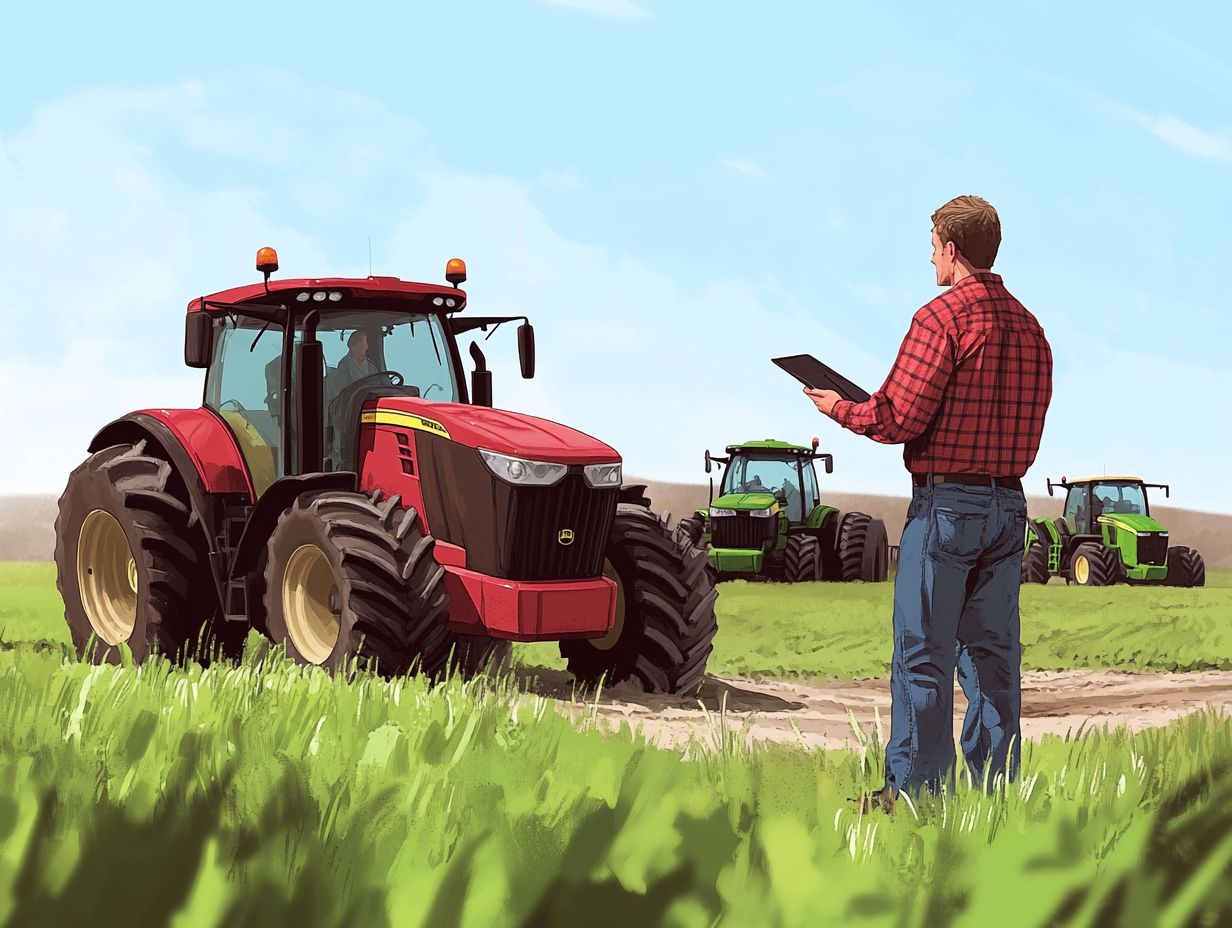
Grasping the various types of coverage available for farm vehicles is essential for farmers looking to safeguard their investments and operations from a multitude of risks and liabilities. Understanding coverage for off-road vehicles gives you the power to make informed decisions that protect your livelihood and ensure smooth operations in your farming activities.
General Liability Insurance
General liability insurance is a crucial asset for farmers, acting as a safety net against claims stemming from accidents or injuries related to farm operations. This coverage typically protects you from bodily injury, property damage, and other liabilities, ensuring you re not left financially devastated by an unforeseen incident.
Understanding the significance of coverage limits the maximum amounts your insurance will pay for claims is vital, as they directly influence your financial protection. When integrated into your overall insurance portfolio, proper coverage for farm vehicles not only shields you from accidents but also complements other policies like crop and equipment insurance.
Insurance agents are essential in this journey, guiding you in assessing your specific risks and helping you select the most suitable coverage for comprehensive protection.
Collision and Comprehensive Coverage
Collision and comprehensive coverage are essential aspects of farm vehicle insurance, providing vital protection against damage to your vehicles from accidents or unexpected events. Additionally, understanding coverage for personal pleasure vehicles is important to grasp the distinctions between these two types of coverage to make informed choices.
Collision coverage specifically addresses costs from vehicle accidents like damaging a tractor while making a sharp turn. In contrast, comprehensive coverage covers events like theft or natural disasters that damage your vehicles.
Understanding how each type of coverage functions can significantly reduce your property damage liability, ensuring you maintain both operational efficiency and financial security.
Uninsured/Underinsured Motorist Coverage
Uninsured and underinsured motorist coverage is essential for farm vehicle owners, providing crucial financial protection in the event of an accident with a driver who lacks adequate insurance. This coverage serves as your safety net, ensuring that if you find yourself in a collision with an inadequately insured driver, you can still secure compensation for damages and medical expenses.
Operating farm vehicles often places you at risk, particularly in rural areas where many drivers may not carry sufficient insurance. Without this vital protection, you could be left to shoulder hefty repair costs or medical bills on your own, threatening both your financial stability and your farming operations.
Given the unpredictable nature of road encounters, securing this coverage isn t just a choice; it s a necessity for your peace of mind. Don t leave your farming future to chance! Act now to secure your farm s financial future!
Factors Affecting Coverage for Farm Vehicles
Several factors influence coverage for utility vehicles that you should consider, including vehicle weight, location and terrain, and the specific farming operations you engage in. Each of these elements plays a crucial role in determining the overall risk exposure you face as a farmer.
Location and Terrain
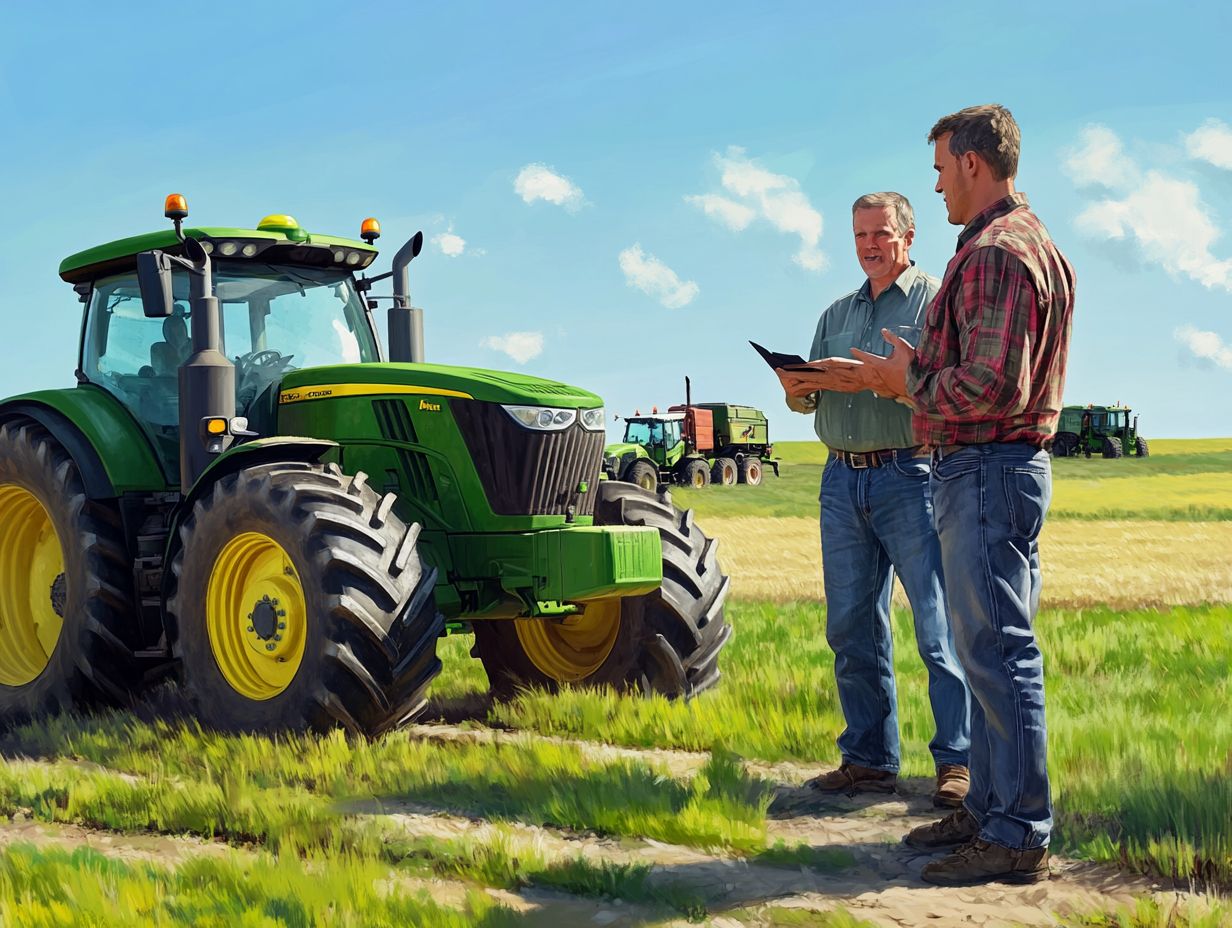
The location and terrain where your farm vehicles operate significantly influence their insurance coverage, thanks to the varying risk factors tied to geographical and environmental elements.
Urban areas often present unique challenges. Higher traffic density can increase the risk of accidents and theft, which might drive your premiums up.
On the flip side, rural settings may have fewer vehicles on the road, potentially lowering risks. However, they come with their own set of concerns, such as natural disasters, which can disrupt operations and impact your access to coverage.
In hilly regions, your vehicles might face more hazards like steep grades. Conversely, flat landscapes could provide a more straightforward driving experience, affecting the types of coverage you’ll need. Therefore, insurance providers carefully assess these diverse elements to tailor policies that cater to your specific needs as a farmer, based on your location.
Types of Crops and Livestock
The types of crops and livestock you manage on your farm significantly influence your insurance coverage needs. Each agricultural operation carries distinct risk factors that insurance providers must carefully evaluate.
If your farm specializes in dairy production, you may encounter unique liabilities related to animal health and public safety. This could necessitate more comprehensive coverage against potential accidents or product recalls than a grain farming operation, which primarily focuses on crop yield and market fluctuations.
If you embrace organic farming practices that rely on specific pest management techniques, you may introduce new risks, such as contamination, that require tailored policies to address these concerns.
By understanding how your chosen farming practices interact with their corresponding risks, you can effectively navigate the insurance landscape, ensuring that you are well-protected against unforeseen losses or liabilities.
Usage of Farm Vehicles
The intended usage of your farm vehicles, whether for personal or commercial purposes, significantly shapes your insurance needs and coverage requirements for effective risk management.
If you’re using a farm vehicle for personal errands, you might find that less comprehensive coverage suffices compared to vehicles used for business operations. Understanding coverage for recreational vehicles can help determine if a personal vehicle insurance policy could be adequate for those casual trips to town or transporting family members, focusing mainly on liability coverage.
If your vehicles are engaged in agricultural tasks like hauling equipment or transporting goods a commercial auto policy becomes essential. This policy offers broader protection against liabilities associated with business activities, providing peace of mind.
It’s crucial to note that commercial policies may have specific exclusions or limitations, underscoring the importance of understanding the nuances that dictate coverage levels. Evaluating the primary use of these vehicles is vital to ensuring you have adequate protection against potential risks.
Choosing the Right Coverage for Your Farm Vehicles
Choosing the right coverage is essential for your peace of mind don t wait until it s too late! Selecting the ideal coverage for your farm vehicles requires a thoughtful evaluation of your specific needs and budget.
Take the time to compare various insurance providers, ensuring you identify the most suitable options available in the market that align perfectly with your requirements.
Assessing Your Needs and Budget
Assessing your needs and budget is a critical step in selecting the right insurance options for your farm vehicles. This ensures you have the protection you need without straining your finances.
Evaluating your specific coverage requirements, tailored to your unique farming operations, is essential. This careful evaluation helps you find the best policies while managing your budget wisely.
Engaging with insurance agents who grasp the specific risks and needs tied to agricultural activities can enhance this assessment. They can shed light on potential coverage gaps and offer suggestions on how to allocate your funds effectively. This way, you ensure that every dollar spent contributes meaningfully to the overall safety and sustainability of your farming venture.
Comparing Different Insurance Providers
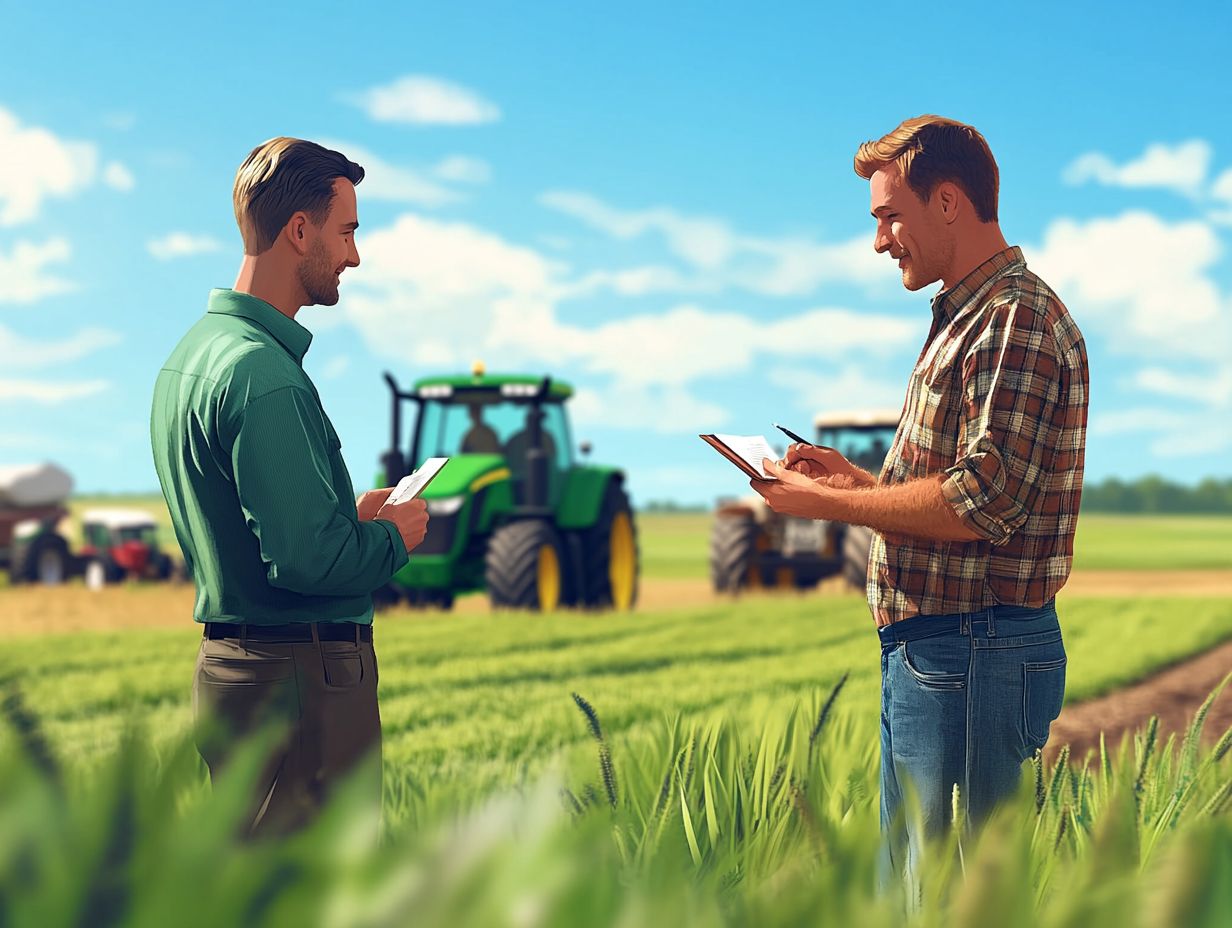
Comparing different insurance providers is essential for you as a farmer to identify the coverage options that best meet your unique needs. This ensures you receive economic solutions tailored specifically to your farming operations.
In the agricultural sector, evaluating these providers means looking into various elements, such as the types of coverage available crop, livestock, and liability insurance each of which can significantly impact your financial stability. It s also crucial to consider the responsiveness of customer service, as you may require timely assistance during critical moments.
Another important factor is the claims process. A simple claims process reduces stress during emergencies.
Explore these factors to make informed decisions that not only protect your investments but also foster long-term sustainability in your operations.
Watch this video to learn more about finding the right insurance for your farm vehicles.
Frequently Asked Questions
What is Coverage for Farm Vehicles?
Coverage for Farm Vehicles refers to insurance protection specifically designed for vehicles used in farming operations. It provides financial protection in case of accidents, damage, or losses related to these vehicles, similar to coverage for fleet vehicles.
What vehicles are covered under Farm Vehicle Coverage?
Typically, any vehicle used for farming activities such as tractors, trailers, trucks, and other specialized equipment can be covered under Farm Vehicle Coverage. For more details on this, it’s important to understand coverage for specialized vehicles, as specific coverage may vary depending on the insurance provider.
What types of coverage are included in Farm Vehicle Coverage?
- Liability coverage for bodily injury and property damage
- Collision coverage for damage to the vehicle
- Comprehensive coverage for non-collision incidents
- Medical payments coverage for injuries sustained by the driver and passengers
Do I need Farm Vehicle Coverage if I already have auto insurance?
It is highly recommended to have separate Farm Vehicle Coverage in addition to your personal auto insurance. Standard auto insurance policies may not provide coverage for vehicles used for farming activities. To better understand your options, consider learning about coverage for personal vehicles and consult with your insurance provider to discuss your specific coverage needs.
Do I need Farm Vehicle Coverage if I only use my vehicle for personal use?
If your vehicle is primarily used for personal use, your personal auto insurance may provide sufficient coverage. However, if you occasionally use your vehicle for farming activities or transport goods for a profit, you may need to consider adding coverage for special interest vehicles to your policy.
What factors can affect the cost of Farm Vehicle Coverage?
The cost of Farm Vehicle Coverage can vary depending on factors such as the type and size of the vehicle, its usage, the number of vehicles being insured, and the coverage limits and deductibles chosen. To fully understand your options, including coverage for heavy-duty vehicles, it is best to discuss these factors with your insurance provider to determine the most suitable and cost-effective coverage for your needs.
Contact your insurance provider today to find the perfect coverage for your farming needs!




